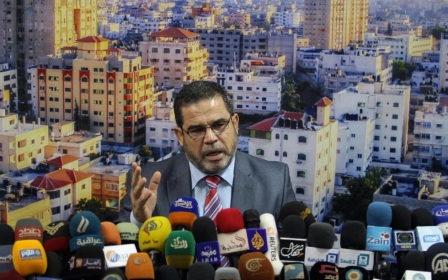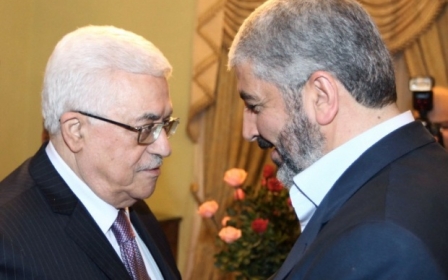Hamas, Fatah discuss Abbas's plan to end occupation amid renewed promises on ICC

A meeting between Palestinian officials from Fatah and Hamas is due to convene on Wednesday under Palestinian Authority President Mahmoud Abbas in Ramallah.
Delegates will be discussing Abbas’s proposal to request a U.N. Security Council resolution to end the Israeli occupation of Palestinian lands.
"The meeting will bring together members from the PLO's executive committee, the central committee of Fatah and secretaries of Palestinian factions," senior PLO member Wassel Abu Youssef told Anadolu Agency.
The talks come after Hamas and Fatah, whose attempts to reconcile after almost 10 years of conflict have frequently faltered, announced on 25 September a “breakthrough” in talks aimed at reviving a unity government.
In a sign that a key stumbling-block in the unity deal may have been resolved, a government official announced that $20m will be transferred to banks in the Gaza Strip on Wednesday to pay in full the salaries of former employees in the Hamas government.
PLO member Abu Youssef told Anadolu that Wednesday’s meeting will discuss “a plan to resort to the Security Council for a resolution on a specific date for the end of Israeli occupation," he added.
In his firebrand speech to the UN General Assembly on Friday, Abbas called for a resolution on a timetable for ending the Israeli occupation of the Palestinian territories and the establishment of an independent Palestinian state on the 1967 borders.
"Israel refuses to end its occupation of the State of Palestine since 1967, but rather seeks its continuation and entrenchment, and rejects the Palestinian state and refuses to find a just solution to the plight of the Palestine refugees," Abbas told the U.N. meeting.
Abbas plans to join the ICC
Abbas told reporters in his office in Ramallah on Tuesday that “we have begun working with the Security Council to secure a state on 1967 border lines with East Jerusalem as its capital.”
If the motion fails, he said he would work on applying to join the International Criminal Court (ICC), a step that would allow Palestine to urge legal action over alleged Israeli war crimes.
“We are putting in place a time-frame of two to three years for ending the occupation.”
Abbas’s proposal will have to obtain nine votes of support from among the 15 members of the Security Council.
However, if any of the five permanent members of the Security Council (the US, the UK, Russia, China and France) vote against the proposal, the motion will be scotched.
Asked if he worried that US will use its power of veto in the coming discussion, as many expect it will, Abbas was unperturbed.
“What will happen after the veto? We will go to international institutions, the first of which will be the ICC.”
Hamas and Fatah, the two warring parties representing the Gaza Strip and the West Bank respectively, have both publicly announced their support for Palestine joining the ICC.
However, Middle East Eye revealed in early September that Abbas had blocked Palestine’s application in a closed-door meeting at The Hague.
Security co-ordination
Abbas also promised that if his Security Council motion fails, he will “look again” at the security co-operation between the Israeli army and the Palestinian Authority forces under his control.
The co-ordination between the forces has provoked anger in the West Bank and the Gaza Strip, with PA forces accused of blocking protesters’ access to Israeli army checkpoints and using excessive force.
Though Abbas hinted that the promise of ongoing security co-ordination between Israel and the PA could be used as a bargaining chip in the coming negotiations, he rejected any suggestion that he would allow another intifada, or uprising, in the West Bank.
“I won’t allow a single bullet to be fired.”
Stay informed with MEE's newsletters
Sign up to get the latest alerts, insights and analysis, starting with Turkey Unpacked
Middle East Eye delivers independent and unrivalled coverage and analysis of the Middle East, North Africa and beyond. To learn more about republishing this content and the associated fees, please fill out this form. More about MEE can be found here.




